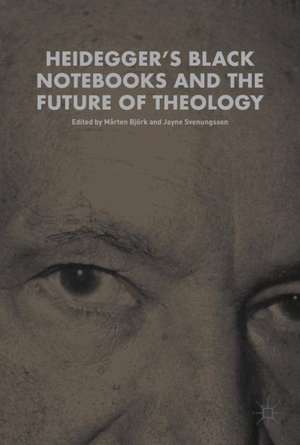Heidegger’s Black Notebooks and the Future of Theology
Editat de Mårten Björk, Jayne Svenungssonen Limba Engleză Hardback – 10 ian 2018
| Toate formatele și edițiile | Preț | Express |
|---|---|---|
| Paperback (1) | 1000.24 lei 6-8 săpt. | |
| Springer International Publishing – 4 iun 2019 | 1000.24 lei 6-8 săpt. | |
| Hardback (1) | 1004.12 lei 6-8 săpt. | |
| Springer International Publishing – 10 ian 2018 | 1004.12 lei 6-8 săpt. |
Preț: 1004.12 lei
Preț vechi: 1224.53 lei
-18% Nou
Puncte Express: 1506
Preț estimativ în valută:
192.16€ • 199.88$ • 158.64£
192.16€ • 199.88$ • 158.64£
Carte tipărită la comandă
Livrare economică 15-29 aprilie
Preluare comenzi: 021 569.72.76
Specificații
ISBN-13: 9783319649269
ISBN-10: 3319649264
Pagini: 416
Ilustrații: XII, 322 p.
Dimensiuni: 148 x 210 x 25 mm
Greutate: 0.57 kg
Ediția:1st ed. 2017
Editura: Springer International Publishing
Colecția Palgrave Macmillan
Locul publicării:Cham, Switzerland
ISBN-10: 3319649264
Pagini: 416
Ilustrații: XII, 322 p.
Dimensiuni: 148 x 210 x 25 mm
Greutate: 0.57 kg
Ediția:1st ed. 2017
Editura: Springer International Publishing
Colecția Palgrave Macmillan
Locul publicării:Cham, Switzerland
Cuprins
1: Introduction: Heidegger and Theology after the Black Notebooks.- 2: Religion in the Black Notebooks: Overview and Analysis.- 3: In the Spirit of Paul: Thinking the Hebraic Inheritance (Heidegger, Bultmann, Jonas).- 4: Why Heidegger Didn’t Like Catholic Theology: The Case of Romano Guardini.- 5: Anarchist Singularities or Proprietorial Resentments? On the Christian Problem in Heidegger’s Notebooks of the 1930s.- 6: Monotheism as a Metapolitical Problem: Heidegger’s War against Jewish Christian Monotheism.- 7: Love Strong as Death: Jews against Heidegger (On the Issue of Finitude).- 8: Apocalypse and the History of Being.- 9: Gottwesen and the De-Divinization of the Last God: Heidegger’s Meditation on the Strange and Incalculable.- 10: Confessions and Considerations: Heidegger’s Early Black Notebooks and his Lecture on Augustine’s Theory of Time.- 11: The Irritability of Being: Martin Heidegger, Hans Driesch and the Future of Theology.
Notă biografică
Mårten Björk is a doctoral student in Theology and Religious Studies at Gothenburg University, Sweden. He is the author and editor of two books in Swedish and has published several international articles. He contributes regularly to various Scandinavian magazines and is on the editorial board of the cultural journal Subaltern.
Jayne Svenungsson is Professor of Systematic Theology at Lund University, Sweden. She is the author of Divining History: Prophetism, Messianism and the Development of the Spirit (2016) and co-editor of Jewish Thought, Utopia and Revolution (2014), Monument and Memory (2015) and The Ethos of History: Time and Responsibility (2018).
Jayne Svenungsson is Professor of Systematic Theology at Lund University, Sweden. She is the author of Divining History: Prophetism, Messianism and the Development of the Spirit (2016) and co-editor of Jewish Thought, Utopia and Revolution (2014), Monument and Memory (2015) and The Ethos of History: Time and Responsibility (2018).
Textul de pe ultima copertă
This book probes the relationship between Martin Heidegger and theology in light of the discovery of his Black Notebooks, which reveal that his privately held Antisemitism and anti-Christian sentiments were profoundly intertwined with his philosophical ideas. Heidegger himself was deeply influenced by both Catholic and Protestant theology. This prompts the question as to what extent Christian anti-Jewish motifs shaped Heidegger’s own thinking in the first place. A second question concerns modern theology’s intellectual indebtedness to Heidegger. In this volume, an array of renowned Heidegger scholars – both philosophers and theologians –investigate Heidegger’s animosity toward the biblical legacy in both its Jewish and Christian interpretations, and what it means for the future task and identity of theology.
Caracteristici
Engages extensively with the significance of Heidegger’s Notebooks for the understanding of his complex relation to theology Addresses the critical question of how long-standing anti-Jewish and anti-Semitic stereotypes inform Heidegger’s philosophy, while highlighting Heidegger’s aversion against and stereotyping of Christian theology Critically re-examines the extent to which large parts of modern theology has relied methodologically on Heidegger, and probes the implications of this reliance in light of the Notebooks Includes supplementary material: sn.pub/extras
